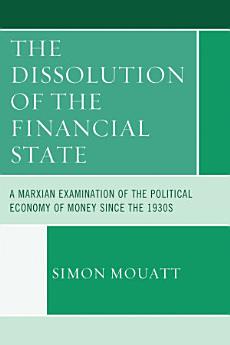The Dissolution of the Financial State: A Marxian Examination of the Political Economy of Money Since the 1930s
Simon Mouatt
Aug 2015 · Bloomsbury Publishing USA
Ebook
276
Pages
reportRatings and reviews aren’t verified Learn More
About this ebook
This book argues that post-Keynesian theories of endogenous money can be combined with Marxian analysis in order to give insight into the changing power relations between the state, finance sector and real economy since WW2. A key theme is that financial power, derived from the control of money-issue and its purchasing power, is determined by the state and market in varying proportions (depending on context) but that state sovereignty has been lost in recent decades. In addition, the growth of financial markets in recent decades, so-called financialization, has led many to assume that private finance is an important proximate driver of economic affairs in general. In contrast, the book argues that this provides insufficient explanation of events. To discuss financial factors as causes of financial crisis risks describing the phenomena without illustrating the root causes. Instead, the book argues that systemic drivers of capitalism (rooted in production), probably best understood by Marx, actually do provide a more plausible explanation of the causes of the financialization and erosion of state sovereignty. In addition, the Post-Keynesian descriptions of monetary processes are considered to best reflect the actual reality of the monetary system. This represents an interesting synthesis of the classical Marx with modern money theory. The interpretation of Marx used to explain this financial transformation has been named the Temporal Single System Interpretation, which illustrates Marx’s value theory across periods and identifies a tendency towards falling profit rates. It is claimed that falling profits, in turn, are an underlying driver of the systemic propensity towards financialisation, crisis and stagnation. The empirical findings presented, taken from case studies of the UK and Germany, appear to support this view.
The central argument is that the response of agents (including the state) to the profit tendency has been a significant driver of the observed financial transformation. The book then concludes that this synthesis provides a more appropriate explanation of the historical transformation of the financial system since the Great Depression, than much of the financialization literature, and illustrates the source (and operation) of financial power in the modern capitalist state and market.
The central argument is that the response of agents (including the state) to the profit tendency has been a significant driver of the observed financial transformation. The book then concludes that this synthesis provides a more appropriate explanation of the historical transformation of the financial system since the Great Depression, than much of the financialization literature, and illustrates the source (and operation) of financial power in the modern capitalist state and market.
About the author
Simon Mouatt is associate professor at Southampton Solent University.
Rate this ebook
Tell us what you think.
Reading information
Smartphones and tablets
Install the Google Play Books app for Android and iPad/iPhone. It syncs automatically with your account and allows you to read online or offline wherever you are.
Laptops and computers
You can listen to audiobooks purchased on Google Play using your computer's web browser.
eReaders and other devices
To read on e-ink devices like Kobo eReaders, you'll need to download a file and transfer it to your device. Follow the detailed Help Center instructions to transfer the files to supported eReaders.





